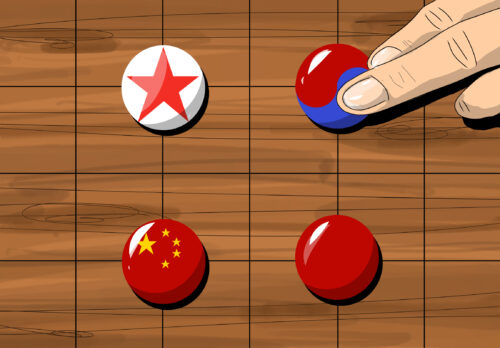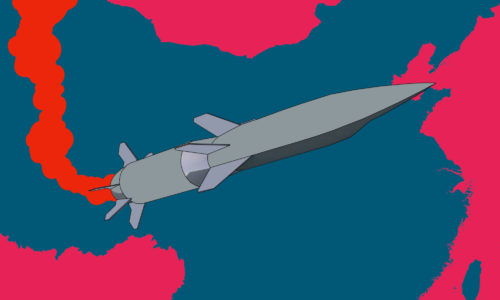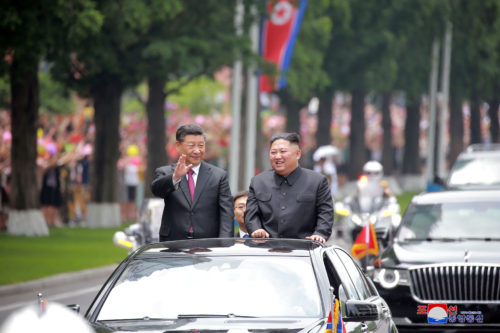BRICS summit overshadowed by North Korean nuke
Kaiser Kuo’s selection of the top stories from China on September 5, 2017. Part of the daily The China Project newsletter, a convenient package of China’s business, political, and cultural news delivered to your inbox for free. Subscribe here.

North Korea crisis hits a BRIC wall
Kaiser here, sitting in for Jeremy, who’s on vacation. The big story over the long weekend: North Korea’s detonation of what it claims was a hydrogen bomb, apparently timed to coincide with the opening of the BRICS summit (link paywalled) in Xiamen.
As one potential conflict heated up, another cooled down appreciably. Both Xi Jinping and Narendra Modi sounded conciliatory notes after their summer standoff in Doklam. Xi was less generous with Trump: Without naming any country in particular, he took what were clearly shots at the U.S. president in his opening address over Trump’s withdrawal from the Paris Agreement and his economic nationalism. Trump threw some shade of his own, the target of which was as obvious as Xi’s: He tweeted a threat to stop “all trade with any country doing business with North Korea.” No ambiguity over whom he might have meant.
Debate continues over how much leverage China actually has over North Korea. Writing on this for the BBC, Kerry Brown, professor of Chinese studies at King’s College, London, contrasts China’s image of growing global strength with its impotence on North Korea. While it’s likely that Beijing will acquiesce in tougher sanctions on Pyongyang, odds are that neither China nor Russia will agree to the total embargo of oil Trump now wants.
And Trump might do well to remember what happened the last time the U.S. imposed a total oil embargo on a bellicose East Asian country.
For a refreshingly original take on how the U.S. and China might address the North Korean problem, listen to our Sinica Podcast interview with Lyle Goldstein of the U.S. Naval War College.
More recent developments on the BRICS summit:
- Mexico plays the ‘China card’ / The Atlantic
Mexico, as it faces the possibility of Trump terminating NAFTA, is turning increasingly to China. - China censors discussion of North Korea bomb / BBC
And further developments with North Korea:
- China ‘shoots down incoming missiles’ during exercise over waters close to North Korea / SCMP
- North Korea’s nuclear test site at risk of imploding, Chinese scientist says / SCMP
Allegations of ethics violations by Dutch newspaper
Many foreign correspondents in China lean heavily on their Chinese news assistants for translation and interpretation, story ideas, media clipping, research, and much more. Often unable to write under their own bylines, the zhongmi 中秘 are the unsung heroes of foreign news bureaux. Over the weekend, a news assistant at a Dutch paper leveled serious accusations against his boss, prompting a storm of indignation among people already convinced that foreign news outlets were writing biased “fake news” about China, and prompting strenuous denial from the reporter, Oscar Garschagen of NRC Handelsblad’s Shanghai bureau.
- A correspondent’s guide to making fake news in China / China Data Insider
- Dutch China correspondent accused of “fake news” by former assistant / What’s on Weibo
- Dutch newspaper responds to controversy over China correspondent / What’s on Weibo
For those of you playing Fantasy Politburo League…
With the 19th Party Congress now only six weeks away, China-watchers are making their predictions and putting together their bland bureaucratic dream teams. Here are some tips for politburo punters!
- All the president’s men: China’s politburo line-up a measure of Xi’s power / Reuters
- China’s reformist central banker could be a tough act to follow / NYT (paywall)
- Wang Qishan reappears after month-long absence from media / people.com.cn (Chinese) – h/t to Bill Bishop
And if you’re counting on blue skies in the ‘Jing as recompense for the myriad inconveniences the Party Congress will inevitably visit on capital residents, think again: The smog may be arriving early this year.
Islamophobia watch:
China’s 21 million Muslims account for only 1.5% of the country’s population, but from the volume and sheer intensity of anti-Islamic sentiment on China’s social media you’d think they were a pervasive and existential threat. The last year has seen rising fears of the “Halalization” of the Chinese diet, anger over supposed privileges extended to the Hui minority, and indignation over laws intended to protect Muslims from discrimination. Now, a brawl allegedly involving Chinese Muslims over the treatment of a cleric at a Tangshan tollbooth has created an online firestorm. Read all about it in the Global Times here, and get a little context in this Sinica Podcast from earlier this year.






